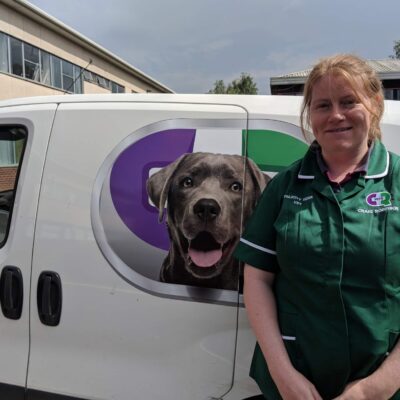Emergency? Call 01228 521 393
Calf Pneumonia
What is it?
- Bovine respiratory disease (BRD) or pneumonia usually occurs in young, housed calves.
- It causes inflammation of the lung tissue and airways and can cause irreversible damage if severe. It is a common cause of death and poor performance.
- Pneumonia costs the cattle industry approximately £50 million a year.
- Cost of pneumonia varies between £43 per dairy calf and £82 per suckler calf.
- It can be caused by a variety of difference viruses (such as RSV, IBR, Pi3, BVD) and/or bacteria (such as Mannhaemia haemolytica, Pasteurella multocida, Histophilus somni, Mycoplasma bovis). Lungworm can also cause respiratory disease in cattle of all ages.
- Environmental factors (see below) and immune status of the animal also contribute to this.
Signs of Pneumonia:
- Reduction in feeding
- Dull demeanour
- Dropping of the head
- Increased respiratory rate
- Nasal discharge
- Cough
- Raised temperature
- Poorer growth rates or performance in more chronic cases
- Death
Diagnosis:
- Clinical signs
- Farm history
- Nasal swabs and/or bronchioalveolar lavage samples
- Blood samples
- Post-mortem
- (Faecal samples if suspect lungworm)
Prevention and treatment:
- Vaccination
- Environmental factors:
- Avoid mixing calves of different ages
- Avoid overcrowding
- Good hygiene
- Good ventilation
- Good drainage where relevant
- Reduce dust as much as possible
- Other management factors:
- Adequate colostrum at birth (5% of the calf’s birth weight in first 4 hours but ideally in the first 20 minutes (so 2L for a 40kg calf or roughly 20mins on the dam), then another feed roughly 6 hours later, and good quality)
- Reduce stresses especially at times of year when high risk of pneumonia (roughly a month after housing) including weaning, castration and disbudding/dehorning)
- Clipping backs of housed calves to reduce sweating can help if relevant
- Use calf jackets when colder weather
- Reduce any other stresses as much as possible
- Speak to your vet about a treatment protocol appropriate for your farm
© 2024 Craig Robinson Vets.



